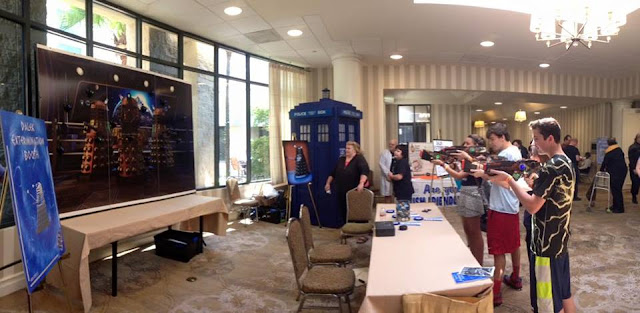 |
| When the kids at the pool are mean...cheerfully clean up after them |
|
"Hi, my name's Eric, can I play with you guys?"
It's a simple enough question. What I have observed is that there are mainly three responses, at least in the area I live in:
- An awkward mumbled "sure" that is followed by a few minutes of trying to figure out what my son is talking about, and some attempted corporate play.
- Laughter and sustained ridicule from a distance.
- Occasional, but rare, real inclusion of the ASD child with a random group of kids. This is usually the result of either the adults or the children
involved "knowing someone" with autism and making a choice to overlook
"weirdness" and make room for the child. We need a LOT more of this out there.
Number Two is what we MUST change. In a world that has chosen to require acceptance of all manner of individual expressions of humanity--- race, gender, love, lifestyle, disability, etc., there is still so much distrust of the "different" that pursuing "acceptance" has become the ground war of the 21st century, and based on results, children, teens, and adults with Autism Spectrum Disorder are still faced with a great many challenges when they try to be part of mainstream society.
We can do better.
What happens when a family with an ASD person is faced with dealing with rejection and/or social pushback every time they try to participate in normal civic activities with their autistic child/teen/adult? Often, they simply quit going out there at all.
Do you know a family with an autistic child? Did they vanish from the places you used to encounter them, either slowly over a few years or dramatically over a few months? Were you secretly glad you no longer had to "put up with" their child's behaviors and hear stories about what the family is "doing about" those behaviors? Did you let that family disappear by not calling them, or no longer inviting them to things? Did you quietly, in your own mind, decide that the parents were just "not doing parenting right"? Did you tacitly sit by while your kids played with the other neuro-typical children you approved of and avoided the clearly autistic child in social settings?
Now I'm talking specifically to you: YOU can do better.
As families impacted by autism, we are doing all we can. Trust me on this. It may not be the "all" that someone else has done, because families are complex webs of human beings who rely on each other and society and "resources" to survive. Stressing the web causes it to warp and change so available resources (emotional, financial, intellectual, physical, etc.) may have snapped at some point and the family may no longer be coping well, but I PROMISE you, they are doing all THEY can to work with their family member on the spectrum. It's not really about YOUR CONVENIENCE, you know.
Okay, I get it... "weird" is only cool when society chooses to believe it is cool, and in this ground war for acceptance, "weird" is the first red flag that gets attention, signaling that maybe something is wrong, and maybe we should just back away to avoid getting involved.
On the other hand, maybe you tried, earnestly, to not let that family drop off of the radar. Maybe you really do care a LOT and went seeking information, looked up things to read about on the internet, talked to people (everyone you could find who had some connection to someone with autism), and maybe you have figured out what the family REALLY needs to be doing. Thanks. Keep that shit to yourself please.
Don't like that response to how hard you tried? Suck it up, buttercup. It's not about you.
------------------------------------------------------------------------------------------
Here's what you CAN do to include someone with ASD (first we will tackle "stranger encounter" tips):
- Require your child to include outsiders in corporate play. It won't hurt them.
- Require your child to be polite. Accept that the ASD person has different criteria for "polite" than you do.
- In the event that the "weird" kid is insulting or loud, or confusing, or gets his/her boundaries all wrong and declares your child "my best friend ever" after three minutes of play time...let it go. Try to assume your best "he/she means no harm" attitude. If whatever just happened won't matter in five years, it doesn't matter right now.
- If you need to engage the caregiver (who is probably already intervening before you even get a chance to go over there), please choose to believe the best of everyone involved. The worst thing for a stranger encounter is that dreaded sense of "I must defend/explain my child" to someone who has already decided the child intended harm.
- Check your prejudiced judgment of the caregivers' parenting/grandparenting/babysitting. Does the judgment help? Does it solve problems? Do you have the training and skills to make that call? Has your little darling never done anything you wish he/she hadn't in public where everyone makes these judgments?
Here's what you can do if you know the family, even peripherally, and you encounter them in a public space (These are things that might just keep them from dropping off the radar and vanishing):
- Assume nothing
- Ask direct questions about what you should expect. Listen to the answers. Believe them. The family KNOWS what the spectrum interaction means for their loved one.
- You really don't know THIS family because you know THIS OTHER family.
- When there is trouble on the child level...just because the ASD person is the most memorable, they might not be the most likely cause of the problem. So, we're back to ASSUME NOTHING.
- If the ASD person did in fact start something, it's probably not what you think.
- Assume nothing. It's important so I'll repeat it.
-----------------------------------------------------------------------------
A personal anecdote:
What happened at the pool in the hour before I took the picture of my son with all those silly noodles?
Well, unfortunately, the response to "Hi, my name's Eric, can I play with you guys" was a full blown #2 and he was met with humiliating and ridiculing rejection. The mother sort of tried to require her child to play with mine (told him to go play with mine after I stared hers down as he was laughing at my son), but in the end, did not actually require anything of her son or his playmate. When they went to leave the pool area, her son dumped all of those noodles you see up there into the pool. She watched him and did not require him to fish them out. Since it was closing time, my son decided to do the staff a favor and go get them out. The staff appreciated it. But the heartbreak for me as his mom was that he was more aligned with the staff that with children his own age. How much would it have diminished their hour in the pool to include him?
So, how does it happen, how do you end up deciding not to go out in the world with your ASD child?
Our family's decline into social isolation happened like this: I would take my family out in public, we would try to control my son, he would get overwhelmed, he would get noticed (though he was hurting no one, the noticing usually came from his stimming, or scripting, or loud and odd commentary, or his crying/refusal to cooperate with me, or.... you name it, it happened), and I would get stares and the occasional ugly comment. In an effort to not draw my SON's attention to how different he was, and in a stupid effort to ease the discomfort of strangers wherever we went, I started to stop going out and doing things.
---------------------------------------------------------------------------------------
The Take Away From This Blog Post:
Neuro-typical children NEED to play with ASD children.
They will grow up to live, love, and work beside them.
The world where the ASD's can hide and not bother you no longer exists.
If we don't get our children able to co-exist, we will create a giant class of adults who cannot work or play together. That is a much more serious problem than you might think at first.
Schools are increasingly separating out the ASD people because it is more convenient to group them in order to manage them. This leaves us with public spaces---churches, pools, parks, zoos, playgrounds, malls, restaurants, movies, concerts, events, etc., as the only means we have to keep our kids/teens/adult family members socialized and connected. The task is urgent. We must figure out, as a society, a way to include the "weird" and the "different" and the "challenging" because if we do not, we all lose.
A quick case study and a cautionary tale:
My autistic husband is a nuclear safety engineer, one of about four people in the country who can do what he does to keep all of us safe. In our locale especially, where there are five nuclear power plants in driving distance, we need him. His ability to do his job as well as he does hinges on both his ASD qualities and his internal sense of well-being. Isolation impinges on that sense of well-being. He still struggles out there with people's perception of him. He still avoids too much interaction as a result. We all need him to be good at his job. I need him to be kind and not overwhelmed. You need him to stay good at his job, because if something goes wrong with one of those plants, unless you and I are good friends already...you're probably not gonna know which way to drive to save your family. :P
I imagine a world where my son and my husband do NOT hide to avoid the awkwardness of others' perceptions of them. For my son, it looks like a whole lot of this:
"Yes! My name is 'so and so'
and we're playing 'this game'.
Join us!"







































